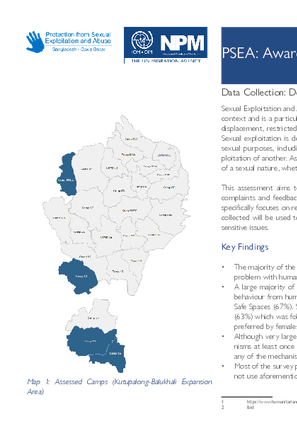-
Countries
-
Data and Analysis
-
Special Focus
-
Crisis Responses
Bangladesh — PSEA: Awareness of Reporting Mechanisms for Sensitive Issues in the Rohingya Camps

Contacter
NPM Bangladesh, npmbangladesh@iom.int
Langue
English
Emplacement
Bangladesh
Période couverte
Jan 01 2021
Dec 31 2021
Activité
- Survey
- Community Perception
Sexual Exploitation and Abuse by humanitarian workers (“SEA”) can occur in any humanitarian or development context and is a particular risk in emergency contexts characterized by violence, gross power imbalance, mass displacement, restricted access, dismantled family and societal structures and gender and social inequalities. Sexual exploitation is defined as actual or attempted abuse of a position of vulnerability, power, or trust, for sexual purposes, including, but not limited to, profiting monetarily, socially or politically from the sexual exploitation of another. As another form of GBV, sexual abuse is defined as actual or threatened physical intrusion of a sexual nature, whether by force or under unequal or coercive conditions.
This assessment aims to understand Rohingya population’s knowledge and the perception of the available complaints and feedback mechanisms (CFMs) in the camps. Besides the general complaints, this assessment specifically focuses on reporting sensitive issues, especially on Sexual Exploitation and Abuse (SEA). Information collected will be used to improve existing complaint and feedback mechanisms and increase the reporting of sensitive issues.
Key Findings
• The majority of the respondents (80%) know what to do if they want to raise a complaint and/or face any problem with humanitarian assistance or services.
• A large majority of females (82%) would go to their families when they face a sensitive issue such as bad behaviour from humanitarian workers, which was followed by reporting the issue to the Women and Girls Safe Spaces (67%). Similarly, for males, family was mentioned by the highest number of male respondents (63%) which was followed by InfoHubs/ Information and Feedback Centers (47% of males) which were less preferred by females.
• Although very large majority of the respondents (88%) reported that they have used one of the mechanisms at least once for their complaints and feedback. the majority of the respondents (82%) did not use any of the mechanisms before for the reporting of sensitive issues.
• Most of the survey participants (55%) reported that non-confidentiality is the main reason why they would not use aforementioned channels for the reporting of any sensitive issues
